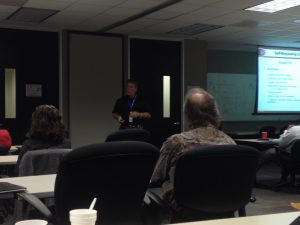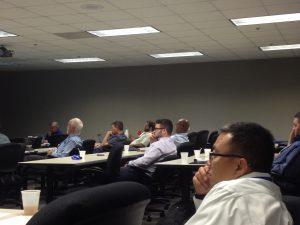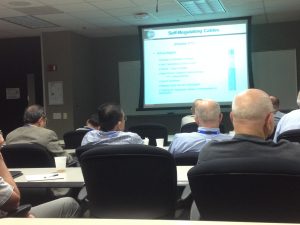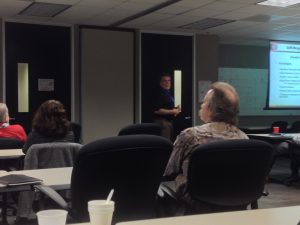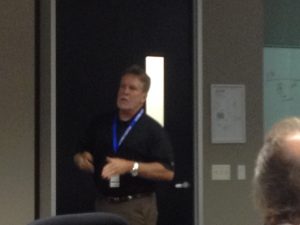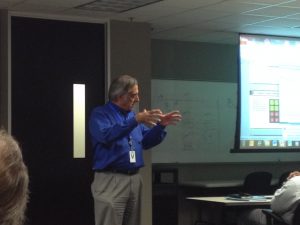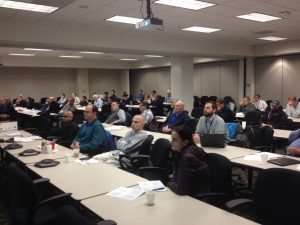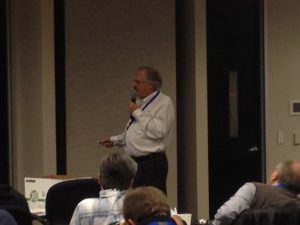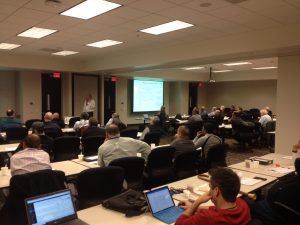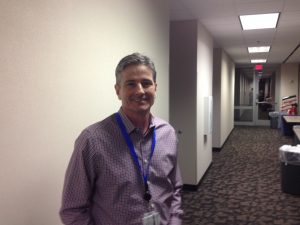Welcome to the 2017 – 2018 Continuing Education on Demand (CED) Seminars section. You will find information on the different seminars, authors, and presentations presented during the year. Some presenters have elected to not have their presentations shared.
© 2018 IEEE. Personal education of the material is permitted. Permission from IEEE Houston Section must be obtained for all other uses, in any current or future media, including reprinting/republishing this material for advertising or promotional purposes, creating new collective works, for resale or redistribution to servers or lists, or reuse of any copyrighted component of this work in other works.”
October 3rd – 4th, 2017
| Area Classification 101 | |||||||||||||||
| Discuss standards used to perform area classifications. Review hazardous locations and identify field examples. | |||||||||||||||
| Presenter | Vincent Wedelich (Burns & McDonnell) | ||||||||||||||
| Vincent Wedelich, P.E. – Project Manager with Burns & McDonnell with Specialties in Engineering, Architecture, Construction, Environmental and Consulting Solutions. Vincent is a project manager and business development consultant with substantial project (EPCM) and manufacturing experience. Vincent has strong communication skills, as well as team building skills who focuses on project management (EPCM), business development, problem solving, and coaching/mentoring. | |||||||||||||||
| Presenter | Simon Palacio (Burns & McDonnell) | ||||||||||||||
| Simon Palacio, P.E. currently works in the Power Distribution and Control group of Burns & McDonnell’s Transmission and Distribution division. His responsibilities include performing electrical systems studies, designing substation grounding grids, and programming electronic relays with a focus on applications in the chemical and refining industries. | |||||||||||||||
EAC 101 October 3-2017 rev1
EAC 102 October 4-2017
October 17th & 18th, 2017
| Severe Residual Voltage Motor Bus Transfer Torques | |||||||||||||||
| ANSI C50.41 states, “Induction motors are inherently capable of developing transient current and torque considerably in excess of rated current and torque when exposed to out-of-phase bus transfer” with the magnitude of transient current and torque ranging from 2 to 20 times rated. Since a motor bus is an aggregate of different motors and loads, it’s unrealistic to create an industry criterion for the transfer of the aggregate bus based on individual motor rated torques. Data from motor bus transfer events at industrial facilities were analyzed with a transfer metric, based on the ratio of the aggregate peak torque at transfer to the aggregate running load torque prior to transfer. These results were then compared with the C50.41 torque range from 2 (good) to 20 (bad) times rated, and per unit Volts/Hertz criterion, calculated at the instant of transfer presently used to determine an acceptable transfer. To calculate the aggregate motor torques before and at transfer, time domain oscillographic samples of voltage and current signals are used to calculate the real power drawn by the motors. Induction motor air gap torque is air gap power divided by synchronous speed. Analyzing field cases, calculating Torque Ratio and comparing with the per-unit Volts/Hertz value, demonstrate the validity of this Torque Ratio metric for determining an acceptable limit for transfer. | |||||||||||||||
| Presenter | Tom Bechwith (Bechwith) | ||||||||||||||
| Tom Beckwith has over forty-five years’ experience in the electric power industry, encompassing the fields of product and systems design, field applications and commissioning, and sales and marketing. Beginning in 1970, Tom worked for Beckwith Electric Co., initially as an R&D Design Engineer and later in Systems Engineering, Field Commissioning and as Production Manager. He subsequently held positions as Vice President of Sales and Marketing and President of the Beckwith Engineering Services and Training (BEST) division. Tom has a Bachelor of Science degree in Electrical Engineering (BSEE) from Case Western Reserve University and a Master of Business Administration (MBA) degree from the University of South Florida. He is a member of the IEEE Power Engineering Society and the IEEE Industry Applications Society. He has served on various working groups in the Power Systems Relaying Committee since 1972. He is a co-inventor of a 1993 U.S. patent on a Multifunction Protective Relay System. | |||||||||||||||
November 14th & 15th, 2017
| Heat Tracing | |||||||||||||||
| The fundamentals of seminar on the modern electrical heat tracing will highlight the various types of heat tracing utilized in the industrial environment for process heating, sample line protection and freeze protection. Special attention shall be given to the various control systems utilized. We will explore the installations methods and the codes and standards that must be observed. And finally, what makes a successful electrical heat tracing project from beginning to commissioning. | |||||||||||||||
| Presenter | John Schramm (Thermon) | ||||||||||||||
| John Schramm has been with Thermon for over 35 years and has held several positions including R&D, Approval Coordinator and product manager. He is a member of IEEE, TC 31, and the working group responsible for the newest trace heating standard “IEC/IEEE 60079-30 Parts 1 and 2. He is also a member of TC27 and the working group that performed the last update of IEC 62395 trace heating standard. He graduated from Southwest Texas State in 1981 with a degree in Industrial Technology. | |||||||||||||||
| Presenter | Peter Baen (Thermon) | ||||||||||||||
Peter Baen has been with Thermon for over 35 years in various capacities from Research Physicist to Corporate Training Director. Baen is an author on numerous steam and electrical heat tracing topics and has had more than a dozen (12) technical articles published internationally. He has also been involved in the development of many different Standards & Recommended Practices related to the testing, selection, installation, operation and maintenance of electrical heat tracing for refining, chemical, power generation and other process industries. Baen is a Senior Member of the IEEE focusing much of his attention on Industry Applications Society (IAS). He has served as Conference Chair for three different IEEE/IAS Technical Conferences, and is presently Chair of the IEEE/IAS Petroleum and Chemical Industry Committee (PCIC).
EHT Reference Info Nov ‘2017 |
|||||||||||||||
January 9th & 10th, 2018
| Advanced Synchronous Generator Topics | |||||||||||||||
| This seminar provides an in depth exploration of an assorted range of synchronous generator related topics with regards to theory, application, sizing, specifying and interaction with other systems: Calculation of arc-flash energy for synchronous generators, common questions for specifying generators, leading power factor load & reactive capability, sizing for UPS loads, Park’s equations & generator system models, IEEE Std. 519 and harmonics, grid codes & cogen applications, exciter response ratio & excitation system models, understanding short circuit decrement curves, synchronization and paralleling, induction vs. synchronous motors and the various starting methods’ effect on generator sizing. | |||||||||||||||
| Presenter | Allen Windhorn (Kato) | ||||||||||||||
| Allen Windhorn received the Bachelor’s degree in Electrical Engineering from the University of Minnesota Institute of Technology in 1972, and Master’s Degree in Electrical Engineering from University of Wisconsin, Madison in 2001. Since February 1986 he has been employed by Kato Engineering Div., Nidec Motors, N. Mankato, MN (USA), with current title Sr. Principal Engineer. His chief interests include machine and system modeling, computational tools, and design innovation methods. He is a licensed Professional Engineer in Minnesota, a member of IEEE and IET, and a licensed Amateur Radio Operator, call WA0OHE. | |||||||||||||||
| Presenter | James Nanney (Nidec Industrial Solutions) | ||||||||||||||
| James Nanney graduated in 1979 from Texas A&M with a bachelor’s in Industrial Distribution. He has been involved with the design, manufacture, application and sales of low and medium voltage motors with Baldor Electric, World Wide Electric and TMEIC Corporation. Currently is working for Nidec Industrial Solutions Division as a Business Development Manager. An author of multiple articles for trade publications, he has presented papers and tutorials for IEEE PCIC dealing with motors and motor/drive applications and a member of the API motor committee. | |||||||||||||||
Advanced Synchronous Generator Topics – IEEE Houston CED 9-10January2018
Induction and Synchronous Motors – IEEE Houston CED 9-10January2018
Sizing Alternators for UPS Loads_white paper_23July13
Alternators – Reactance for Nonlinear Loads_white paper_26Jul13
Sizing Generators for Leading Power Factor_white paper_24Feb14
January 23rd & 24th, 2018
| C37.20.7 new arc resistant std | |||||||||||||||
| C37.20.7 Guide for testing metal-enclosed switchgear rated up to 52kV for internal arcing faults has been revised to include both changes to the basic testing procedure and additional equipment types. The addition of these new equipment types has introduced new ratings and requires alterations to the basic arc fault test procedure. Part one of this presentation will discuss the test procedure changes, compare the new procedure to the previous revision, discuss rating applications, and provide some insight for why the changes were necessary. Part two will discuss properly applying arc resistant switchgear and how it fits into a typical safety program. | |||||||||||||||
| Presenter | Mike Wactor (Powell) | ||||||||||||||
| Technical Director for Corporate Product Development at Powell industries. He has worked in the design and testing medium-voltage and low-voltage circuit breakers, switchgear, and motor control for the past 38 years. He is a senior member of the IEEE and active in the Switchgear committee as the Standards Coordinator and Chair of several working groups. He is a contributing author to the Electrical Engineering Handbook, a 2016 recipient of the IEEE s Standards Medallion, the author of numerous papers, and a professional engineer in the state of Texas. | |||||||||||||||
February 6th & 7th, 2018
| Arc flash hazard mitigation techniques | |||||||||||||||
| The presenters will provide a high-level overview of arc flash hazard and requirements by NFPA 70E – 2015. The course will present different aspects of arc flash hazard exposure and provide mitigation techniques to reduce exposure to personnel. Aramco has done extensive work evaluating how to reduce available incident energy at their facilities. Jim’s segment will review what Aramco is implementing across 1500 substations in Saudi Arabia. In addition, we will discuss recent published research on LVMCC safety improvements that reduce incident energy for open door troubleshooting to 1 cal/cm2. One of the basic tenets of a good protection scheme is fast fault clearing time. This is especially important in mitigating arc flash energy. Matt’s segment will explore the advantages and challenges of implementing a zone-selective interlocking scheme with protective relays to achieve those goals. | |||||||||||||||
| Presenter | Jim Bowen (Aramco) | ||||||||||||||
| Jim Bowen, PE, IEEE Fellow – Forty-one years of experience in Electrical Industrial Power Engineering with expertise in Co-gen, Motors, Process Control Substations and Bulk Power Substation. Jim was elevated to an IEEE Fellow in 2010 for his efforts in Safety by Design. He has Co-authored and presented papers at IEEE PCIC. Jim is active in the IEEE PES switchgear subcommittee. Moreover, currently is an executive officer of IEEE PCIC. Jim is an Aramco internal consulting engineer. | |||||||||||||||
| Presenter | Dominik Pieniazek (HV Engineering, LLC) | ||||||||||||||
| Dominik Pieniazek, P.E. – Twenty-five of experience in Electrical Industrial Power Engineering with expertise in High-Voltage Substations, Generation Plants, Root Cause of Failure Investigations, Electrical System Studies, and Electrical Commissioning. Dominik has presented at IEEE-PCIC, NETA and IEEE CED. Dominik is president and founder of HV Engineering, LLC. | |||||||||||||||
| Presenter | Matt Proctor (GE Multilin) | ||||||||||||||
Matt Proctor, PE, IEEE Member – Graduated with his BSEE from LSU in 2001 and his MBA in 2005. Matt has experience in utility distribution operations, industrial distribution design, power system studies (load flow, short-circuit, arc flash, motor starting), transmission system protection. Matt specializes in power systems protection and control as a Relay Application Engineer for GE Grid Automation.
Arc Flash PresentationZone-Selective Interlocking |
|||||||||||||||
February 21st & 22nd, 2018
| A survey of medium voltage VFDs, specifications, and practical challenges | |||||||||||||||
| The presenter will explain applications and benefits of using medium voltage VFDs. The presentation will include a high-level overview and comparison of commonly used medium voltage variable frequency drives. Comprehensive guidelines will be provided to help end users properly specify a MV VFD. Practical challenges such as cooling and safety will be addressed. | |||||||||||||||
| Presenter | Navid Binesh (Benshaw) | ||||||||||||||
| Navid Binesh, graduated with MASc from Ryerson University in Electrical Engineering. During his research, which was focused on multi-level variable frequency drives, he collaborated closely with R&D team at Rockwell Automation working on parallel connected CSIs (PowerFlex 7000 product). Later, he joined R&D team at Siemens to work on SINAMICS GH180 (Perfect Harmony) product line. Currently, he works for Benshaw, a brand of Regal Beloit, contributing to development and applications of M2L 3000 product. He is a member of IEEE, focusing much of his attention on Power Electronics society (PEL) and Power and Energy society (PES). He is serving Pittsburgh section as Secretary. He is a Vice-President candidate for the year of 2018. A Survey of Medium Voltage Drives, Specifications, and Practical Challenges Presentation |
|||||||||||||||
March 6th & 7th. 2018
| GAS TURBINE GENERATOR (GTG) – GOVERNOR / AVR / GENERATOR CAPABILITY for INDUSTRIAL FACILITIES | |||||||||||||||
| A combination of three directly related GTG control application topics – governor speed control, automatic voltage regulator voltage control with an explanation of the generator capability curve fundamentals and limitation. Industrial applications include islanding and non-islanding generating facilities. PCIC 2011 governor presentation, PCIC 2016 AVR presentation and 1953 IEEE generator capability paper are emphasized. | |||||||||||||||
| Presenter | Roy Cossé (Chevron) | ||||||||||||||
| Roy E. Cossé, Jr. (BSEE/MSEE) – forty-five plus years Electrical Industrial Power Engineering application experience in upstream, downstream, offshore, and petrochemical industries, with a specialty in power system analysis. A professional engineer registered in Texas (inactive) and Louisiana. Since 1995, founder/presenter of IEEE Houston Continuing Education seminars. Co-authored and presented IEEE PCIC and Pulp and Paper conference technical papers/tutorials. Mr. Cossé is a Chevron Senior Staff Electrical Engineer.
Field Excitation in Relation to Machine and System Operation |
|||||||||||||||

